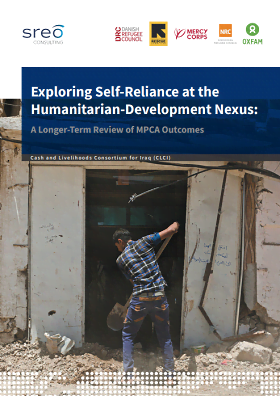Exploring Self-Reliance at the Humanitarian-Development Nexus: A Longer-Term Review of MPCA Outcomes
Multi-Purpose Cash Assistance (MPCA) is provided to extremely socio-economically vulnerable individuals to alleviate financial hardship. In Iraq, MPCA is intended to act as temporary consumption support so that households may eventually be linked with social protection assistance or return to income-generating activities after the period of shock has passed. The long-term effects of the protracted armed conflict in Iraq have led to sustained levels of unemployment and the social safety net system cannot support the 1.7 million people that are still in need of humanitarian assistance. The nature of the context in Iraq is transitional at the time of the study, as it shifts from humanitarian crisis towards longer-term development (referred to as the Humanitarian-Development Nexus). In this context, there come greater expectations for and scrutiny of what MPCA can achieve and be deployed to mitigate the worst effects of protracted crises and build resilience to future shocks, thereby reducing future humanitarian need.
The design of the study was such that the CLCI’s socioeconomic vulnerability tool was used as a framework to create a definition of self-reliance by considering the characteristics of those households at the other end of the spectrum from being eligible for MPCA and 1,258 households across all CLCI governorates of intervention were interviewed who had received MPCA from the CLCI 9-12 months prior to the period of the study. The study found that one quarter of households supported with MPCA 9-12 months before were no longer eligible for assistance and that diverse income sources were determinants of self-reliance and presence of vulnerable household members reduced the likelihood of self-reliance. When comparing the statistical versus subjective measures of self-reliance, stark differences were found.



